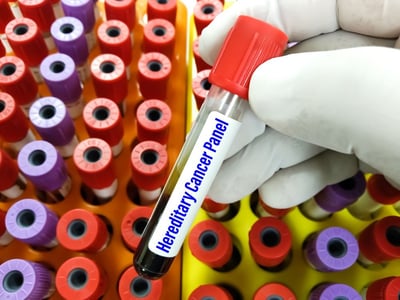FORCE's eXamining the Relevance of Articles for You (XRAY) program looks behind the headlines of cancer news to help you understand what the research means for you.
XRAY is a reliable source of hereditary cancer research-related news and information.
Learn more about the XRAY program
Relevant for: previvors, In portal: Ovarian Cancer
Relevance: Medium-High


Strength of Science: Medium-High


Research Timeline: Post Approval


Study : Risk of peritoneal cancer is low for people with an inherited BRCA mutation after surgery
Relevance: Medium-High


Strength of Science: Medium-High


Research Timeline: Post Approval


Most relevant for: People with a BRCA1 or BRCA2 mutation who have had risk-reducing surgery to remove their ovaries
The risk of peritoneal cancer is low in people with an inherited BRCA1 or BRCA2 mutation after risk-reducing ovary removal (oophorectomy). The risk was even lower when risk-reducing surgery was done at a young age and after 2005 when removal of the fallopian tubes was included in the procedure. The findings of this research support the theory that like ovarian cancer, peritoneal cancer begins in the fallopian tubes and reinforces the age recommendation for surgery. (Posted 1/23/25)
Read More
Relevance: Medium-High


Guideline : Hereditary cancer gene guidelines expand
Relevance: Medium-High


Most relevant for: People at high risk for hereditary cancer
The National Comprehensive Cancer Network regularly updates guidelines for several types of hereditary cancer. These recommendations often change when new research is published. Recently, the NCCN expanded its guidelines to include information on hereditary prostate and gastric cancers. (Posted 1/6/25)
Este artículo está disponible en español.
Read More
Relevance: High


Strength of Science: High


Research Timeline: Post Approval


Study : Ovary removal reduces risk of death from any cause in people with BRCA mutations
Relevance: High


Strength of Science: High


Research Timeline: Post Approval


Most relevant for: People who have had a risk reducing bilateral oophorectomy
People who test positive for an inherited BRCA1 or BRCA2 mutation can reduce their risk of ovarian cancer by having both ovaries and fallopian tubes removed. A study published in 2024 found an added benefit of this surgery – a lower risk of death from any cause by age 75. (Posted 5/23/24)
Este artículo está disponible en español.
Read More
Relevance: High


Quality of Writing: Medium-High


Article : Genetic testing and the future of medicine
Relevance: High


Quality of Writing: Medium-High


Most relevant for: People interested in genetic testing.
An article published in Katie Couric Media discusses genetic testing and how it can impact health. The author talked with Dr. Robert Steiner, a doctor who specializes in genetics. He talked about genetic testing and how the results can affect health and change lives. (Posted 9/28/23)
Este artículo está disponible en español.
Read More
Relevance: Medium


Topic : Impact of new laws on cancer treatment during pregnancy
Relevance: Medium


Most relevant for: People who have cancer who are pregnant
The U.S. Supreme Court ruled in 2022 that abortion is no longer a protected right under the Constitution. This landmark decision leaves regulation of abortion to the states. Cancer treatment during pregnancy may now be impacted in states that have abortion bans or limitations. (Posted 5/31/23)
Este artículo está disponible en español.
Read More
Relevance: Medium


Strength of Science: Medium-High


Research Timeline: Human Research


Study : Early removal of ovaries may be linked to small increase in risk of Parkinson’s disease in later life
Relevance: Medium


Strength of Science: Medium-High


Research Timeline: Human Research


Most relevant for: Women considering risk-reducing removal of both ovaries
The lifetime risk of developing Parkinson’s disease is low. However, having surgery to remove both ovaries before natural menopause can slightly increase the risk of Parkinson's disease later in life. Researchers studied over 20 years of medical records, which confirmed this small increase in risk, particularly for women who have their ovaries removed before age 43. (Posted 5/3/23)
Este artículo está disponible en español.
Read More
Relevance: Medium-High


Strength of Science: Medium


Research Timeline: Human Research


Study : Hormonal birth control may reduce ovarian cancer risk in people with BRCA mutations
Relevance: Medium-High


Strength of Science: Medium


Research Timeline: Human Research


Most relevant for: Women with BRCA1 or BRCA2 mutations who are interested in reducing their ovarian cancer risk
Hormonal birth control pill is linked to reduced ovarian cancer among people with an inherited BRCA mutation. Longer-acting forms of birth control given by implant, injection or as an intrauterine device may be associated with lower ovarian cancer risk for people with an inherited BRCA mutation. (Posted 4/28/23)
Este artículo está disponible en español.
Read More
Relevance: Medium


Strength of Science: Medium-High


Research Timeline: Post Approval


Study : Frequent aspirin use may reduce the risk of ovarian cancer
Relevance: Medium


Strength of Science: Medium-High


Research Timeline: Post Approval


Most relevant for: Healthy people at high-risk of ovarian cancer.
Aspirin may help lower the risk of ovarian cancer in people who have a high risk of the disease, according to a new analysis of 17 studies. While other preventive strategies have been found to more effectively lower the likelihood of developing ovarian cancer in high-risk women, taking aspirin daily or almost daily may reduce a person’s risk of developing ovarian cancer by 13 percent. The benefit was greater among people with additional risk factors for the disease. (Posted 2/22/23)
Este artículo está disponible en español.
Read More
Relevance: Medium-High


Strength of Science: Medium-High


Study : Teens and young adults respond well to learning about familial cancer risk
Relevance: Medium-High


Strength of Science: Medium-High


Most relevant for: Mothers who have had genetic testing for BRCA1 or BRCA2 whether or not they have been diagnosed with breast or ovarian cancer
Little is known about how awareness of hereditary cancer in a high-risk family affects the quality of life of teens and young adults. This study looked at the lifestyle choices, cancer awareness and quality of life of adolescents and young adults whose mothers had undergone testing for a BRCA mutation. (Posted 10/11/2022) Este artículo está disponible en español.
Read More
Relevance: High


Quality of Writing: Medium-High


Article : How your ovarian cancer diagnosis can help your relatives
Relevance: High


Quality of Writing: Medium-High


Most relevant for: People diagnosed with ovarian cancer
This media article provides tips from experts and the CDC for talking to family members after a diagnosis of ovarian cancer. It highlights which family members may be at risk of developing ovarian cancer or passing on genes that increase risk. The article provides links to resources, talking points, alternative methods of communication and potential reactions. (Posted 7/28/22)
Este artículo está disponible en español.
Read More